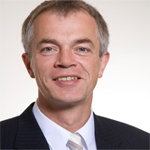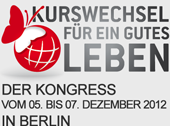Since July 2010 the green party member Johannes Remmel is minister for climate protection and environmental care in North Rhine-Westphalia. The NRW government has ambitious objectives. The goal is to reduce the emission dramatically and to lead the traditional core of the German industry, the sector of carbon and steel, to a provider of high technology in the future market for climate protection.
What´s the future for cole in the state NRW, that is directly connected with its economic center „Kohlenpott“?
Remmel: In nowadays, coal has still a percentage of 72% of the gross electricity production and brown coal part still contains 41%. In comparison, renewable energy only contributes 10% to the energy mix. The coal mining is going to be terminated in 2018. The current brown coal mines have already the confirmation until 2045. At the moment 15 new power plant projects are planned or in construction - this amount contains 5 stone coal, 8 gas and steam plants and 2 pumpstore power plants. It doesn´t work without difficulties. Referring to the scenarios, that the government has declared to its fundament, the brown coal percentage in the energy generation should be reduced to the half until 2030 and the stone coal percentage to a quarter as well.
Cole doesn´t play a big role in future. For you as a green, it must be beautiful when the CO2 polluter disappear?
Remmel: Of course I am happy, when we progress in climate protection but I am also carrying about employment and future perspectives of the workers. By the way, since 1990 the industry in NRW has already reduced the carbon dioxid emission about 40%. Concerning the coal power plants: A lot of energy companies say: The between 2006 and 2008 planed power plants would not be accepted of the investors under the current conditions because they aren´t economic. They are only economic, if they are working 24 hours per day. And that´s not the case, when renewable energies have total priority in bringing the energy into the grid.
And what´s the alternative?
Remmel: In future, we need types of power plants that are providing security, I mean, to substitute the renewable energies when there is not enough wind nor sun. We need a lot of capacity and power plant that work highly efficient, most decentralized and fast steerable. Usually, these are gas power plants that are producing energy and heat.
They let the people wait sucessfully. Why is happening so less?
Remmel: There are no investments, because there is no security in planning at all. In gas, as well as, for pumpstore power plants. At the latest next year the government has to decide how the design of the energy market will look like in order to establish security in investments and planning. With a percentage of 25 percent of renewable energy, it is not possible to talk about market introduction; it is more about a market design. The questions here fore are: How can we realize a most inexpensive possibility for the consumers? How can we realize a market structure that facilitates Investments?
In NRW are big steel factories. Does a green politian like you consider exceptions for energy intensvie companies in facilitating renewable energies (e.g. EEG-Umlage) as correct?
Remmel: We need the energy intensive companies at the beginning of the value chain. Also, to create climate friendly products. For example the Aluminium industry to build light cars or the steel industry to produce wind energy. I don´t want to abolish regulation of exceptions. But you have to have a differed look. The exceptions must be limited to companies that are in competing worldwide. In addition, the exceptions have to be linked to certain conditions, that the companies introduce an effective energy management system. They must bring the evidence, that all of them realize the technological possibilities to use energy responsible, efficient and economical. A lot of big companies already do that. One fundamental thing: We want to sustain the production in the areas here and keep the capability in order to compete international.
What kind of plans has the red-green government in NRW to bring the energy transition to success?
Remmel: We are making a strong effort to utilize our potential in the cogeneration of heat and power. We want to provide efficient and decentralized energy. The interesting thing in industrial regions is that we have a cooperative thinking of energy and heat production. This is an unappreciated jewel. The heat market makes 40% of the energy demand. Second, we facilitate renewable energies. Third, we build highly efficient and flexible powerplants as well as energy storage devises. The North-Rhine-Westphalian government adopted the first German climate protection law and integrated mandatory objectives. The greenhouse gas emissions should be reduced until 2020 to 25% and until 2050 down to 80%. We already decided a climate protection start programme in 2011. The package contains 22 particular activities and has a volume of several million Euros from incentives and credits. We decided an investment programme in our coalition: 50 million Euros are going to get invested in the cogeneration of heat and power. We give advise to the communes intensively. There are two big investment projects in the Eifel and in East-Westphalia about a half billion Euros. At it, it is about pumped storage hydro power station. We support considerations of the RAG (German Coal Corporation) about a feasability analysis. At it, it is about pumped storage hydro power station at Halden or underground. And we work together with municipal utilities and water unions in order to install pumped storage hydro power stations at river dams.
Beside the climate protection law in NRW, there is a climate protection plan as well. What´s it about?
Remmel: That society and politics consider the energy change and the climate protection as a common task. We want to bundle the powers. It should be a transparent process where all the affected groups like industry, labor unions, environmental unions and representatives of citizen work together as one.
NRW has passed a massive structural change. What´s the relevance of the energy change for the structure of economy and the emplyment?
Remmel: Right now only in NRW 26.000 people are employed in companies of renewable energy. There is still room for further gains. A lot of chemical companies and mechanical engineers produce for the branch of the renewable energies. In the last 100 years the technological steps have been connected almost every time with energy. NRW offers with it strong industrial base, good requirements for the development of climate protection technologies and processes. We have to focus on our future lead markets. Personally, I see our future in delivering the infrastructure of climate protections and as well as the products for it. We offer technological solutions, efficient machines and chemical insulating materials. „Climate protection made in NRW“ can raise to a strong brand with big advantages in competition. The provincial government facilitates and supports this way actively.



